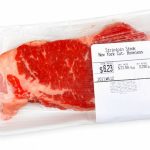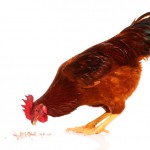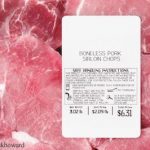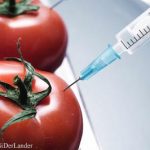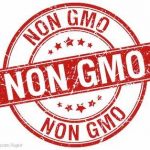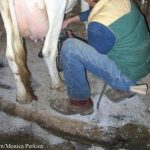A study published in the December issue of the journal Obesity has found that consumers think more information about added sugars on nutrition labels will be helpful. Food manufacturers believe that more information would simply confuse consumers. The study looked at 500 U.S. adults in a voluntary online survey. Most consumers, or 63%, said that knowing how much added sugar was in a food product (as opposed to naturally occurring sugar) would be helpful. Just 18% of respondents thought that adding this information would be confusing, but most of those people gave reasons "that suggest they were indifferent to the information," according to the researchers. Those reasons included "I don't know" and "I don't care." FDA wants to declare added sugar on food labels and has proposed a … [Read more...]
U.S. Appeals WTO COOL Ruling
The United States has appealed the World Trade Organization (WTO) ruling on country of origin labeling (COOL) about labeling meat products that are imported. COOL has been in the news for years ever since the program began in the 2008 Farm Bill. USDA released a final rule in May 2013, requiring that meat labels include where the animal was born, raised, and slaughtered. Canada and Mexico promptly appealed the rule to the WTO, threatening to retaliate with possible trade tariffs. In 2012, WTO ruled against COOL in April and June, saying that it unfairly discriminates against Mexico and Canada because of record keeping and verification requirements. WTO ruled against COOL for a third time in October 2014. The U.S. appeal is within the 60-day appeal time period. Canadian Ministers Ed … [Read more...]
Appeals Court Won’t Rehear COOL Dispute
The fate of country-of-origin labeling (COOL) law took another turn when the U.S. Court of Appeals for the District of Columbia Circuit rendered a decision not to rehear the dispute. So unless the U.S. Supreme Court takes the case, the USDA rules that producers put information about where meat was raised and slaughtered on labels will stand. But the World Trade Organization disagrees. The countries of Canada and Mexico have sued the United States several times, stating that these labels discriminate against producers in their countries who export meat to America. Canada and Mexico could impose steep tariffs on U.S. exports in retaliation. Consumer and food safety advocates want meat labels to include information about where beef cattle, for instance, are born, raised, and slaughtered … [Read more...]
WTO Rules Against COOL. Again.
The World Trade Organization released its compliance panel reports on the United States "country of origin labeling" (COOL) disputes Monday, and ruled against the United States. WTO found that "the amended COOL measure violates Article 2.1 of the TBT Agreement because it accords to Canadian and Mexican livestock less favourable treatment than that accorded to like US livestock." The ruling states that COOL has a "detrimental impact" on competitive opportunities of imported livestock because it necessitates "increased segregation of meat and livestock according to origin." WTO also states that the labels place a higher record keeping burden on imported meats, and increases the potential for label inaccuracy. Consumer advocates, including Center for Food Safety, are disappointed by … [Read more...]
Perdue and HSUS Reach Settlement over Chicken Labeling
The Humane Society of the United States and Perdue Farms have reached a settlement of two federal cases over Perdue's "humanely raised" claim on its Harvestland chicken labels. HSUS will dismiss their claims with prejudice, in exchange for Perdue removing the label claim. Peter Petersan, Director of Animal Protection Litigation for HSUS said in a statement, "we are pleased to see the claim removed from Harvestland's packaging, which we view to be misleading. We will continue to work to protect both animals and consumers." HSUS sued Perdue twice. The first was in New Jersey. Perdue tried to have a similar case dismissed, which paved the way for that action to proceed. The second lawsuit, a class action matter, was filed on behalf of Florida consumers and alleged that Perdue raised … [Read more...]
Senators Ask That COOL Not be Weakened
U.S. Senators have sent a bipartisan letter to the Senate Appropriations Committee, asking that efforts to weaken or suspend Country of Origin Labeling (COOL) be rejected while discussing funding for the government for Fiscal Year 2015. COOL was created in response to consumers asking for information about where the meat and seafood they buy comes from. Implementation of COOL has been challenged in international courts for more than five years. The letter states that the Senate shouldn't undermine the U.S. position on this issue by inserting a legislative rider into an Appropriations bill before the World Trade Organization decision on the matter is final. The ruling isn't public yet, but other countries are trying to resist COOL implementation because they think it would hurt their … [Read more...]
More Opposition to GMO Labeling Bill
Representative Mike Pompeo (R-KS), the single largest recipient of campaign funds from Koch Industries in 2010, introduced a bill to Congress last week titled the "Safe and Accurate Labeling Act of 2014" (HR 4432) that is anything but. The bill would stop states from requiring labels on food produced from genetically engineered (GE) and genetically modified (GMO) products. It would also make voluntary labeling for GE foods the national standard, ensure that GMOs can be labeled as "natural", and create its own rules for non-GMO labeling. Food and Water Watch opposes this bill, as it is written exactly as Monsanto, the corporation that holds most patents to GMO foods, would want. Politico leaked the language back in January 2014 as the work of the Grocery Manufacturers Association. That … [Read more...]
New Bill Would Repeal State GMO Labeling Laws
A bill introduced in Congress yesterday would give the U.S. Food and Drug Administration sole authority to require labeling of genetically modified foods, overturning state laws that require such labeling. The bill, introduced by Reps. Mike Pompeo (R-Kansas) and G. K. Butterfield (D- North Carolina,) is named the “Safe and Accurate Food Labeling Act of 2014” (HR 4432) but has been quickly dubbed the Deny Americans the Right to Know (DARK) Act by consumer groups. The bill's authors say that genetically modified crops are safe, require less water and pesticides and can better feed the growing global population. They also maintain that such a law would spare farmers and other food producers the expense of complying with a patchwork of state laws that could mislead consumers and raise … [Read more...]
South Dakota May Change Labels on Raw Milk
Raw milk sold in South Dakota may get a new label that states "Warning. Raw milk. This product has not been pasteurized and may contain harmful bacteria." The state has proposed two rule changes for the sale of raw milk, which is only permitted directly on the farm or delivered directly to consumers from the farm. In October 2012, Agriculture officials in South Dakota found Campylobacter bacteria in raw milk from Black Hills Milk in Belle Fourche, South Dakota. It was discovered during routine testing. A recent National Animal Health Monitoring System survey found that 92.6% of dairy farms had Campylobacter-positive cows. More than 33% of all cows tested were infected; all of the cows were "outwardly healthy". In addition to the label change, the allowed bacterial count per … [Read more...]
Center for Food Safety Tells FDA GE is Not Natural
The Center for Food Safety (CFS) is asking the FDA to tell the Northern District Court of California they will not define the marketing label "natural". CFS says that complying with the Court request would violate federal law. The FDA needs to define the label through the Administrative Procedure Act rule-making process. The court case that spurred the request is about ingredients in products that are produced using genetically engineered seed. The case is about foods grown from GE or GMO seeds being labeled "natural", "all natural" or "100% natural". Defining the term "natural" is controversial. In 1993 the agency issued guidance saying that the only ingredients not allowed in a food labeled "natural" are added colors, synthetic substances, and flavors. The FDA does not have a … [Read more...]


